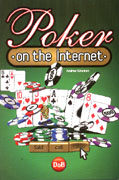
Poker on the Internet

'Poker on the Internet' Good For Live Players
It's hard to imagine a phenomenon that has grown faster in recent years than online gambling. The Internet has brought together people from around the world to share in many common endeavors, and playing Nick Christenson is widely regarded as one of the best gambling book reviewers publishing today. He is a contributor for Poker Player magazine, and has published in Full-Tilt and Gambling Times. He is also the editor of the very funny 'Casino Death Watch,' which chronicles the comings and goings of casinos in Las Vegas. He is an avid poker and blackjack player. Nick's website is www.jetcafe.org/~npc/ poker is high on this list. Even though the skills required to play good poker are essentially the same in both worlds, online poker has many aspects that make it a different animal than it's live counterpart. In order do their best on the Internet, a player must master nuances of the online game. In Poker on the Internet, Andrew Kinsman tries to provide the information that will allow a live player to effectively make this transition.
Nick Christenson is widely regarded as one of the best gambling book reviewers publishing today. He is a contributor for Poker Player magazine, and has published in Full-Tilt and Gambling Times. He is also the editor of the very funny 'Casino Death Watch,' which chronicles the comings and goings of casinos in Las Vegas. He is an avid poker and blackjack player. Nick's website is www.jetcafe.org/~npc/ poker is high on this list. Even though the skills required to play good poker are essentially the same in both worlds, online poker has many aspects that make it a different animal than it's live counterpart. In order do their best on the Internet, a player must master nuances of the online game. In Poker on the Internet, Andrew Kinsman tries to provide the information that will allow a live player to effectively make this transition.
Kinsman begins the book with an introductory chapter that includes a description of just what Internet poker is all about, a brief history of the online game, and some observations about gambling on the Internet in general. The history isn't meant to be exhaustive, but it certainly provides enough information for the reader to put what they're doing in an appropriate context. Obviously, the legal situation surrounding online poker is very fluid, but the author presents a pretty accurate and balanced picture of the situation at the time the book went to press.
Kinsman then moves on to covering the differences between live and online play, followed by an outline of how players interact with online poker software and sites. The author discusses the benefits of tracking opponent stack sizes, looking for online tells, tracking the virtual "lobby", note taking, and other ways to obtain an edge in Internet poker. Overall, these methods are pretty well considered. While Kinsman may not provide any industry-shaking revelations, there are at least some ways in which he looks at these issues that seemed fresh to me.
Chapter four provides reviews of the major online card rooms. Kinsman discusses some of the relative strengths and weaknesses of the top eleven online poker rooms based on various criteria that potential players might consider important. Of course, he is taking aim at a moving target, but the author is does a good job in stating what are his specific likes and dislikes so that the reader can adjust their own personal evaluations appropriately. Some of his information is already out of date, but that's inevitable in a book such as this. The book concludes with a list of good information sources available on the Internet as well as a recommended reading list.
This book is not a poker strategy guide by any means. A novice will not learn how to play poker, much less learn how to play and win, by reading this book. This is a book that advises a poker player on how to adapt to the milieu of online poker. This is by no means a failing of the book, but inexperienced poker players who desire to learn how to play online almost certainly will want to obtain at least one more book in addition to Poker on the Internet.
While there probably isn't much here that veteran online poker players who have played on a variety of sites won't know, I think that less experienced players are likely to find quite a bit of value in this book. I really like the tone Kinsman takes in Poker on the Internet. His opinions are carefully qualified and overall well balanced. He covers all the big issues I'd expect a book on this topic to cover, and while he may not provide any breakthroughs, I found his insights on these topics to be well-considered.
On the downside, Kinsman occasionally makes some mathematical misstatements. For example, he states that if one plays multiple tables simultaneously one's variance should decrease. This isn't true. If one plays multiple tables at the same stakes, one's variance per hand will likely stay roughly the same and one's variance per hour will increase (by about a factor of 1.4). There are a few other places where the author says some things that could use amendment, but these tend to be small issues that detract little from an otherwise good book. A great number of poker players would benefit from reading this book, and I recommend it.
